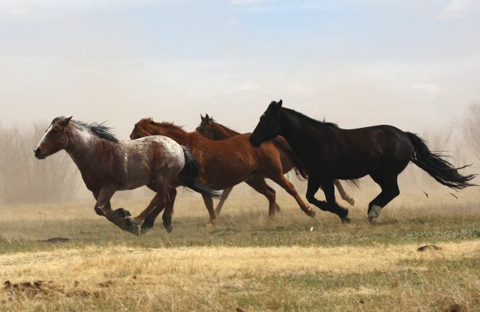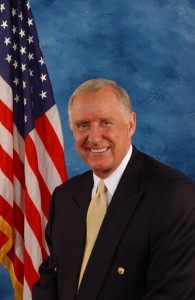
Two separate reactions to the BLM “decision” to keep doing the wrong things – again.
Congressman Dan Burton (Indiana)
(House of Representatives – January 24, 2011)
 Mr. Speaker, last week, at the request of a lady named Madeline Pickens, I met with Mr. Bob Abbey, who is the head of the Bureau of Land Management, to talk to him about dealing with the wild horses, the mustangs that roam out west in the western States. The Bureau of Land Management has somewhere between 35,000 and 40,000 of these mustangs in pens around the country; and the cost of this is estimated to be as much as $2,500 per horse per year. The Bureau of Land Management just last week started rounding up another 3,000, 4,000, 5,000 of them to take them to holding pens and move them to Oklahoma.
Mr. Speaker, last week, at the request of a lady named Madeline Pickens, I met with Mr. Bob Abbey, who is the head of the Bureau of Land Management, to talk to him about dealing with the wild horses, the mustangs that roam out west in the western States. The Bureau of Land Management has somewhere between 35,000 and 40,000 of these mustangs in pens around the country; and the cost of this is estimated to be as much as $2,500 per horse per year. The Bureau of Land Management just last week started rounding up another 3,000, 4,000, 5,000 of them to take them to holding pens and move them to Oklahoma.
Now, the thing that’s interesting about this is that when I talked to Mr. Abbey, he admitted that they want to move these horses from Nevada 1,000 miles to Oklahoma in order to put them in these pens. Now Ms. Pickens, she is very concerned about these mustangs because they’re part of America’s heritage, and she wants to protect them as much as possible. Toward that end, she bought two ranches, the Spruce Ranch, which has 14,000 acres in it, and the ranch next to it in Nevada, the Warm Creek Ranch, which has about another 4,000 acres; and then she got permits for another 550,000 acres so that they could put those horses on this land, protect them, and save the taxpayer money and make sure that these horses will not be put in pens and shipped all over the country.
But the Bureau of Land Management is recalcitrant. They want to move these horses 1,000 miles into these pens, and they want to keep them there at a cost of as much as $2,500 per year per horse.
Now, Ms. Pickens says that for $500 a year, she can keep them on her range and protect them, create a kind of museum for these horses so that people can come and see them in the wild. And she would have them injected so that they can’t reproduce; therefore, they wouldn’t have to worry about an expanding population of mustangs, but they would be protected. But the Bureau of Land Management wants to move them a thousand miles, where her ranch and her permits are within just a few miles of where the horses are right now.
Now, when I talked to Mr. Abbey last week, he said that they couldn’t reach an agreement with Ms. Pickens, that there’d have to be some major changes made over at the Bureau of Land Management in order for them to facilitate what she wants to do.
This is another bureaucratic nightmare that we in this Congress should not—and I don’t believe will—put up with. And I’m going to ask the Appropriations Committee to cut the budget of the Bureau of Land Management because they’re wasting the taxpayers’ money by millions and millions and maybe hundreds of millions of dollars.
Last year, the government spent about $144 million managing private livestock on Federal public lands, and they only collect $21 million for grazing rights. So they lost at least $123 million per year. And some people estimate that they lose as much as $500 million a year, half a billion dollars, by keeping these grazing lands in private hands where people get them for almost nothing. $21 million was what the fee was that they got last year.
So they’re losing as much as $500 million; they’re moving these horses up to a thousand miles, and they’re doing it for no good purpose other than the bureaucracy wants to keep control of them.
Now, the reason Ms. Pickens started this organization to protect these mustangs was because, in 2008, the Bureau of Land Management said, well, they weren’t sure they could take care of all of these horses—they have almost 40,000 in these pens right now—so they were thinking about killing them, euthanasia, starting to kill these horses.
Well, the people who love these mustangs and love the West the way it was don’t want this to happen. So they came up with this organization to deal with the problem in a realistic way so that the horses wouldn’t be killed. The organization they started when they heard they were going to euthanize them was called Saving America’s Mustangs, and they offered to enter into a contract with the Bureau of Land Management to relocate at least 9,000 of these horses into these lands that they just bought and got permits for so they wouldn’t have to be shipped to these pens a thousand miles away.
Now, it makes absolutely no sense to me, at a time when we’re fighting fiscal problems in this country—we’ve got trillions of dollars in debt, and unless we start cutting spending, we’re going to see this country go into bankruptcy. Moody’s has already said they may have to reevaluate the bond rating for the country.
Let me just end up, Mr. Speaker, by saying it seems to me that we ought to be frugal with the public’s money. We ought to cut the Bureau of Land Management’s budget so that we can save the money and save the mustangs. That’s what this is all about—a humane way of treating the mustangs in this country, which are a part of our heritage.
_________________________________________________________________________________________
The Humane Society of the United States Criticizes BLM Decision to Reject Madeleine Pickens’ Wild Horse Solution
(Jan. 25, 2011)
The Humane Society of the United States strongly criticized the Bureau of Land Management’s decision to reject a proposal by philanthropist and wild horse advocate Madeleine Pickens to create an eco-sanctuary for America’s mustangs. Her plan would be one important component within a broader plan to fix the agency’s broken wild horse and burro management program and to allow the BLM to demonstrate that it is listening to the American public.
The BLM announcement came only weeks after Director Bob Abbey stated publicly that the agency would pursue public and private partnerships in an effort to put the federal government’s dysfunctional wild horse management program on a more sustainable track.
Back in 2008, Pickens first offered to help create life-time sanctuaries for thousands of wild horses and burros currently housed in the BLM’s short- and long-term holding facilities. At the time, the BLM had announced that it would euthanize and sell for slaughter thousands of wild horses, due to a fiscal crisis caused by its failed management policies and programs. Since then, the BLM and Pickens’ foundation, Saving America’s Mustangs, have been working together in an attempt to develop a partnership that would provide homes for wild horses and educate the public about the need to preserve and protect these icons of the American West, while at the same time saving taxpayer dollars.
“The BLM continues to have opportunities to gain ground with the public and to turn its broken wild horse program around, but it continues to deliver self-inflicted wounds,” said Wayne Pacelle, The HSUS’ president and CEO. “The BLM claims that it wants to engage in public-private partnerships, but if the agency refuses to work with a private partner as passionate and creative as Madeleine Pickens, it begs the question: With whom can this agency work?”
Just today, U.S. Rep. Dan Burton, R-Ind., shared his outrage at the agency’s decision. On the floor of the U.S. House of Representatives, he stated, “This is another bureaucratic nightmare that we in this Congress should not—and I don’t believe will—put up with. And I’m going to ask the Appropriations Committee to cut the budget of the Bureau of Land Management because they’re wasting the taxpayers’ money by millions and millions and maybe hundreds of millions of dollars … We ought to cut the Bureau of Land Management’s budget so that we can save the money and save the mustangs. That’s what this is all about—a humane way of treating the mustangs in this country, which are a part of our heritage.”
The BLM’s rejection of Pickens’ wild horse eco-sanctuary comes on the heels of the agency’s rejection of a more modest proposal from Pickens to provide short- and long-term holding for more than 2,000 wild horses scheduled to be removed from Antelope Valley Herd Management Complex in northeast Nevada between Jan. 24 and Feb 28. Pickens’ proposal would save taxpayers thousands of dollars, but the agency refused to postpone the scheduled roundup.
The HSUS has been working with the agency on a contraceptive program to keep wild horses on the range and to control reproduction. But the agency has been too slow to roll out that program, and the agency continues to round up and remove thousands of wild horses, creating a financial burden that the government is going to be hard pressed to meet for years to come.

The BLM decision generated more than two reactions. Check out http://www.dallypost.com/dp/article.php?pub=3&articleid=728
Sorry, I entered a bad link on my previous post. Please check out the other side of the story. http://www.dallypost.com/dp/article.php?pub=1&article_id=728